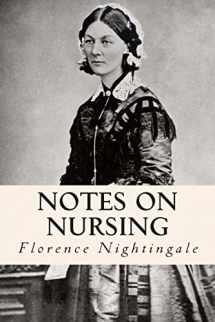
Notes on Nursing
Book details
Summary
Description
Notes on Nursing is a classic historical nursing education text by Florence Nightingale. The following nursing notes are by no means intended as a rule of thought by which nurses can teach themselves to nurse, still less as a nursing manual to teach nurses to nurse. They are meant simply to give hints for thought to women who have personal charge of the health of others. Every woman, or at least almost every woman, in England has, at one time or another of her life, charge of the personal health of somebody, whether child or invalid,--in other words, every woman is a nurse. Florence Nightingale (12 May 1820 – 13 August 1910) was an English social reformer and statistician, and the founder of modern nursing. Nightingale came to prominence while serving as a manager of nurses trained by her during the Crimean War, where she organised the tending to wounded soldiers.[3] She gave nursing a highly favourable reputation and became an icon of Victorian culture, especially in the persona of "The Lady with the Lamp" making rounds of wounded soldiers at night. While recent commentators have asserted Nightingale's achievements in the Crimean War were exaggerated by the media at the time, critics agree on the decisive importance of her follow-up achievements in professionalising nursing roles for women.[6] In 1860, Nightingale laid the foundation of professional nursing with the establishment of her nursing school at St Thomas' Hospital in London. It was the first secular nursing school in the world, now part of King's College London. In recognition of her pioneering work in nursing, the Nightingale Pledge taken by new nurses, and the Florence Nightingale Medal, the highest international distinction a nurse can achieve, were named in her honour, and the annual International Nurses Day is celebrated around the world on her birthday. Her social reforms include improving healthcare for all sections of British society, advocating better hunger relief in India, helping to abolish prostitution laws that were over-harsh to women, and expanding the acceptable forms of female participation in the workforce. Nightingale was a prodigious and versatile writer. In her lifetime, much of her published work was concerned with spreading medical knowledge. Some of her tracts were written in simple English so that they could easily be understood by those with poor literary skills. She was also a pioneer in the use of infographics, effectively using graphical presentations of statistical data. Much of her writing, including her extensive work on religion and mysticism, has only been published posthumously. Florence Nightingale's most famous contribution came during the Crimean War, which became her central focus when reports got back to Britain about the horrific conditions for the wounded. On 21 October 1854, she and the staff of 38 women volunteer nurses that she trained, including her aunt Mai Smith, and 15 Catholic nuns (mobilised by Henry Edward Manning)[18] were sent (under the authorisation of Sidney Herbert) to the Ottoman Empire. Nightingale was assisted in Paris by her friend Mary Clarke. They were deployed about 295 nautical miles (546 km; 339 mi) across the Black Sea from Balaklava in the Crimea, where the main British camp was based. Nightingale arrived early in November 1854 at Selimiye Barracks in Scutari (modern-day Üsküdar in Istanbul). Her team found that poor care for wounded soldiers was being delivered by overworked medical staff in the face of official indifference. Medicines were in short supply, hygiene was being neglected


We would LOVE it if you could help us and other readers by reviewing the book
Book review



